My Dear
Friends,
How many
of you remember Yom Kippur of 1973?
50 years
ago, on Yom Kippur morning, October 6, 1973, when I was 14 years old, the
sanctity of our holiest day of the year was violently and irrevocably disrupted
when the armies of Syria and Egypt launched cross-border attacks through the
Sinai and the Golan Heights against the State of Israel. For the first 48 hours, the Arab armies
experienced significant victories against the IDF, but eventually their
onslaught was thwarted, and Israel went on to defeat her enemies. Victory came
at a very high price, however. The casualty count was unbearable - 2,656
Israeli souls were lost in the fierce fighting. In the war’s aftermath, the
transformation of the political landscape was swift and radical. The
center-left political establishment upon which the nation was founded was
dismantled, and a new era of politics was set in motion that ultimately led to
the ascension of Menachem Begin’s Far-Right Likud party.
Walking
into my synagogue on this holiest of days 50 years ago and seeing and hearing
television sets and radios blaring was an experience I will never forget. I remember how my Rabbi, David Polish – of
blessed memory - set aside his Yom Kippur sermon and organized an impromptu
emergency fund-raising campaign. I
remember the worry etched on the faces of my parents and their friends who were
desperately afraid that Israel might not make it through the first 48 hours.
Many in our community at the time were survivors of the Shoah. Their fear was
real, horrific, and ever-present – the State of Israel was the ultimate answer
to their own experience of Hitler’s evil. On that day, all Jews were united in
love, concern, and support of the Jewish State.
Much has
changed since that fateful Yom Kippur morning 50 years ago.
- While Israel still faces military
threats from Iran and its proxies;
- While the occupation of the West
Bank and the military control of Gaza remain as flash points for both terror
attacks and international condemnation;
- While Israel must continue to remain
vigilant against the enemies that seek its destruction,
…it no
longer faces the same kind of threat with which it was confronted half a
century ago. But, despite Israel’s current military and economic strength, the
vision of a Democratic, Jewish State is threatened – not from external armies,
terrorists, or even diplomatic isolation. No – on this Yom Kippur the very
real, existential threat that the State of Israel faces comes from within – and
I believe (and I am not alone…) that this is the greatest danger it has faced
in its 75 year history.
Let me
explain. As I have repeatedly shared
from this pulpit, the current political leadership in Israel is the most
extreme of any previous government. In order to gain a ruling coalition after
the last election, Prime minister Benjamin Netanyahu joined forces with
far-right, Ultra- Orthodox, fundamentalist firebrands like Itamar Ben G’vir,
and Betzalel Smotrich – both of whom have long rap sheets filled with violent,
racist, Kahanist, misogynistic anti-LGBTQ+ and anti-Reform Jewish statements
and actions. In addition to plotting to weaken the Supreme court, members of
this coalition have pledged to expand settlement in the West Bank, cut funding
to non-orthodox institutions and organizations in Israel, remove protections
for the LGBTQ+ population, limit the rights of Palestinians, implement
far-right religious policies on transportation and cultural events, and end any
hopes for a Palestinian State alongside Israel.
I
strongly condemn the actions of the current governing coalition in Israel. I am
not alone in these sentiments. These concerns have been echoed by politicians
and pundits, religious leaders, and activists around the world and across
multiple political extremes – from Far-Left to mainstream Right Wing.
For the
past 38 weeks, hundreds of thousands of Israelis have been gathering in the
streets of almost every major city in Israel to protest the overreach of the
Netanyahu government.
This
past week, as the Israeli Prime Minister arrived in New York to address the
General Assembly of the United Nation, thousands of American and Israeli Jews
gathered outside Dag Hammarskjold Plaza in New York to protest against the
dangerous, far-right, racist, and misogynist policies that have been proposed.
This was not a fringe group of activists.
They were joined by leaders and representatives of many American Jewish
Institutions - including the Reform and Conservative movements.
Israel
is divided. Tensions are higher than they have ever been. Michael Oren, who
served as Israeli Ambassador to the United States in 2009 for Benjamin
Netanyahu’s then-governing coalition – certainly not a left-wing firebrand –
recently wrote the following:
Israel
stands at a fateful crossroads. In one direction lies chaos and conflict, and, in
the other - conciliation, prosperity, and peace. I call on all Israeli
politicians to love Israel more than they hate one another and to join in a
national unity government that will reach a compromise on judicial reform,
resolve the issues of Haredi education and national service, sideline the
radicals, and achieve peace with the Sunni world. Future generations of Jews
are looking at us for courage. History will judge.
As many
of you know, this past April, I was honored to serve as a delegate for the Reform
movement to the World Zionist Congress. Some of you heard my reflections
following this remarkable experience. I’m going to share some of my experience
tonight as well. The First Congress was held in 1897 in Basel Switzerland. It came about because Theodor Herzl called
for Representatives from Zionist organizations from around the Jewish world to
come to Basel to debate and decide on the future of the Zionist Movement.
Today –
The main purpose of the Congress – which meets every 5-6 years -is to set
forward an agenda for education and allocation of resources from the World
Zionist Organization and it’s affiliates – including, ARZA – (the American
Reform Zionist Association), Haddasah, B’nai Brith, and other groups-that run
the gamut of ideological and political thought in the Zionist world.
As I
shared this past April upon my return, during the Conference, I kept hearing
about three key values around which the foundation of the State of Israel was
established 75 years ago:
- Judaism
- Zionism, and
- Democracy
We use
these words all the time – and yet, depending on who says them, they have
radically different meanings.
So let’s
start with JUDAISM:
The
modern state of Israel is a Jewish State. It was founded to create both a place
of refuge and a center of holiness, education, and innovation for our people –
and it has succeeded in ways that attendees at that first Zionist Congress in
Basel - 126 years ago could never, in their wildest dreams have imagined.
Israel
has produced poets, artists, Intellectual giants, and, of course, technological
innovation that literally has changed the world. All these incredible successes
have been a source of pride and are part and parcel of our Jewish identity
since Israel’s inception.
And yet,
despite Israel’s many successes, the question of the role of Judaism -
culturally, spiritually, and theologically - has become one of the greatest
threats to Israel’s stability – and some even posit, its survival.
In 1948,
David Ben Gurion – Israel’s first Prime Minister, deliberately avoided the
question of how to define the Jewish character of the nascent State – other
than to establish the Law Of Return which immediately granted citizenship to
anyone who has Jewish ancestry. Questions of “Who is a Jew?”, and “How should
Jewish life be recognized, celebrated and defined,” were put off. The Chief Rabbinate of Israel was granted
limited, but significant authority over life-cycle events and Jewish identity,
and the ultra-orthodox community was allowed to segregate themselves from many
aspects of daily life – including serving in the Israel Defense Forces.
Over the
past decades, tensions have risen between the secular and religious
communities. Ben Gurion’s avoidance of the question of Jewish identity – while
prescient at the time - is coming back to bite us now.
The
current government is attempting codify religious exemptions to the draft and
rewrite the Law of Return so that only those who fit a narrow definition of
being Jewish would be allowed access to citizenship. This would exclude any non-ultra-orthodox
converts to Judaism and anyone who was not born of a Jewish mother. This has severe implications for all of us.
Jews who
live active and committed secular, Reform, Conservative or Modern Orthodox
Jewish lives could quite possibly find themselves without a connection to
Israel if some of these legislative reforms are passed. As a result, we are
seeing an acceleration of alienation from, dissatisfaction with, and most
alarming of all: apathy towards the Jewish State.
Which brings
us to our second value: ZIONISM
One of
the key takeaways from my participation in the Zionist Congress was the
realization that, while all the delegates and factions passionately believed in
and supported the Zionist ideal of a Jewish State, their lived experiences,
expectations, and relationship to both the land and people of Israel today
varied widely.
Many of
us grew up with the image of a State founded upon principles embodied by the
Labor Party and the kibbutz movement.
Leaders such as Chaim Weitzman, David Ben Gurion, Golda Meir, and others
represented the triumph of the pioneering spirit that rose out of the ashes of
the Shoah and built a country that would shine as a light to all Nations – an
example of strength and resistance to the Jew hatred that has plagued our
people throughout history.
But,
while the founders of Israel were mostly White, Ashkenazi - or Northern
European Jews, today’s reality is different. Sephardic and Mizrachi – North
African – Jews, who – for generations were relegated to 2nd class status in
Israel, today have a powerful political, spiritual, and social voice- as they
should in a Democratic society. While the pain of the Shoah resonates
throughout the land and is a central canon in Israel’s history, it is not a
universally shared experience. Those Jews who came to Israel from Morocco,
Tunisia, Yemen, Egypt and other places throughout the Levant had their own
generational trauma. Jews from Ethiopia
and, to a large extent, the Former Soviet Union also are appropriately raising
their voices and wielding political power. The image of the pioneering
kibbutznik hero is part of the past – and, until recently, the Left has been in
decline. This may be changing due to the overwhelming numbers of weekly
protestors– but we will have to wait to see what will happen on that front.
This
plays out in multiple arenas. The progressive wing of Israeli politics has been
largely overshadowed and shut down by populist, anti-Arab and Anti-Palestinian
sentiment. In addition, the ongoing occupation of the West Bank and the
continued attacks from Gaza – propelled, in large part by increases in Islamic
fundamentalism brought on by despair has heightened security concerns – thereby
reducing the size and power of the peace camp.
And
finally: DEMOCRACY
Israel
is a democratic country. Full Stop. And
yet, the process of governing in Israel looks very different than what we
imagine takes place in America – even during this chaotic moment in American
history – with all of its dysfunction.
- It’s messy
- It’s loud
- It’s passionate – there’s a lot of
yelling
We saw this in full force at the
Zionist Congress where bedlam frequently broke out in small group debate and
the floor of the plenum.
But it
is also very apparent that Israeli Democracy is under attack – and the few
safeguards that currently exist are endangered. 75 years ago, after the State
was established, war immediately broke out and Israel did not have the luxury
of setting up a constitutional convention. To this day, there is still no
Constitution. The Israeli Declaration of Independence and the basic laws that
govern Israel have served as a sort of Interim foundation for governance. The only check and balance that served to
protect Democracy was the Supreme Court – which is now weakened by this
government.
Let me
be perfectly clear: Debate over Judicial Reform is not inappropriate. It is
worthy of a Democratic state. The problem is that THIS current government is
hell bent, not only on reforming the judiciary, but rendering it impotent
against what many believe to be a corrupt and authoritarian agenda. It is for
this reason that chants of DE-MPKRAT-YA are echoing through the streets of
Israel at the weekly protests.
While
Benyamin Netanyahu and his Likud party did receive the slimmest majority of
votes in the last election (after four failed elections in as many years),
polls show more than 2/3rd of Israelis are against the radical plans to reshape
the religious, political and cultural character of the State of Israel. And
yet, Netanyahu and his compatriots are determined to bulldoze their agenda through
the Knesset despite the dangers it poses to both Israeli society and world
Jewish partnership.
A word
about the protests that have been taking place. These are not protests against
the State of Israel. On the contrary, what we are witnessing is an eruption of
Israeli Patriotism.
The
weekly massive protests are not political in nature – despite the desperate
attempts of Prime Minister Netanyahu to paint them as such.
No –
they are protests of love and concern for the very essence of the Zionist ideal
upon which the nation was founded. I was able to participate in 3 of them and
they were truly inspiring.
If we
compare the number of protestors in the streets of Israel every week to their
equivalent in the United States it would be the same as 10 million weekly
demonstrators here. Think about that!
- The march on Washington at the
Lincoln Memorial in 1968 had 200,000 people who gathered to hear the stirring
words of Dr. Martin Luther King.
- 400,000 people marched through the
streets of our capital at the woman’s march of 2017.
- 500,000 people participated in the
Black Lives Matter protests around the country on June 6, 2020,.
Nothing comes close to what we are
witnessing on a continuing basis in Israel.
Now
there are some who feel – perhaps some who are here tonight - that any critique
of Israel from within the Jewish community is irresponsible and inappropriate.
They agree with Prime Minister Netanyahu and his coalition who have
consistently tried to paint the hundreds of thousands of Israelis taking to the
streets on a weekly basis as traitors to the Zionist ideal. Even the increasing
number of IDF reservists, former generals and chiefs of the Mossad who are
unambiguous in their warnings about the grave danger the current Government’s
agenda poses to the safety, security, and economy are seen as illegitimate and
are the targets of vitriol and personal attack.
On the
opposite side of the equation, there are many who feel - perhaps some of you are here tonight as
well - that Israel can do no right. They have cast their lot with the
Palestinian cause and label Israel as an apartheid state. Nothing short of
dismantling the idea of a Jewish State will appease their opposition.
What
concerns me most, however, are those in the American Jewish Community who are
tired of hearing about Israel.
…..Perhaps
some of you are here tonight as well…..
They
feel no connection whatsoever. Israel is just not important. This, my friends,
is a worrying trend.
Why
should we care about what is happening in Israel? We are not Israelis…. I’ll
tell you why:
Because
when we see Jews carrying out racist, misogynistic, messianic and
fundamentalist policies; when we see attacks on women’s rights, on Reform
Judaism and on basic human decency; when Democratic values are threatened by
greed, authoritarianism and corruption – our tradition commands us to act.
Also –
if these initiatives are allowed to bear fruit – then Israel will become a
legitimate target of international condemnation. As my friend, colleague, and
fellow delegate to the World Zionist Congress, Rabbi Ken Chasen – Sr. Rabbi of
Leo Baeck Temple in Los Angeles writes:
When
Israel is seen as a bad actor in the world, antisemitism increases everywhere.
Jews everywhere suffer. We suffer. We become easily divided. We lose political
power. We are targeted by hate speech and hate acts. You might wish to disown
Israel when you feel it is misbehaving, but history has shown that the world
will not let you .
Tomorrow
we will read from the book of Jonah. We will hear how Jonah was a reluctant
prophet who receives a message from God to prophesy to the Ninevites and warn
them of their destruction if they do not repent. Instead of heeding the divine
call, Jonah runs away. But ultimately, Jonah’s fate catches up with him and he
carries out the divine command.
On This
Yom Kippur – this day of atonement – we are all Jonah. While we might want to
hide our heads in the proverbial sand of complacency or run away from
acknowledging that our beloved Jewish State is sliding towards authoritarianism,
we cannot escape the reality we are facing. We are inexorably linked to the
state of Israel: through our history,
our faith and our birthright.
So, what
can we, as American Jews, do to address these very serious concerns on this –
the holiest night of the Jewish Calendar? Our first task is to recommit
ourselves to supporting the State of Israel – even when we disagree. Please
understand, our support must come from a place of concern and love. When
members of our family lose their way, we do not abandon them – any more than we
enable their self-destructive behavior. Words of rebuke – even condemnation -
must come from the heart. We show our love by showing our concern.
Secondly
– we must find ways to support the organizations and institutions in Israel
that reflect our own values and are on the front lines of combatting
authoritarianism and promoting our egalitarian and democratic values.
In
particular, I urge everyone to support ARZA – the American Reform Zionist
Association - and the World Union for Progressive Judaism. Following Yom
Kippur, we will be sending you links that will tell you how you can show your
support.
[Click HERE for a link to donate]
I want
to conclude my remarks tonight with a prayer written by Anat Hoffman - a dear friend f our congregation and the
former Director the Israel Religious Action Center and a founder of Women of
the Wall:
My God,
At this
sacred moment, give us hope for Israel and her future.
Renew
our wonder at the miracle of the Jewish State.
In the
name of the pioneers who made the deserts bloom - give us the tools to
cultivate a diversity of Jewish expression in Israel.
In the
name of our fallen soldiers - give us courage to stand up to the words and ways
of the zealots. Those in our own midst and those among our neighbors.
In the
name of Israeli inventors who have amazed the world with their innovations -
help us apply the same ingenuity to finding a path to peace.
In the
name of all these women and men - grant us the strength to conquer doubt and
despair in Israel.
Replacing
doubt with action.
Replacing
despair with hope.
And let
us say:
Amen
G’mar
Chatimah Tovah – May we all be inscribed for a blessing in the New Year.


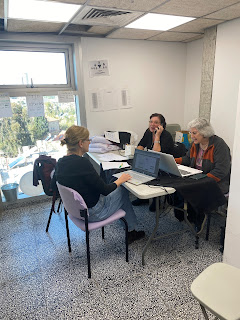









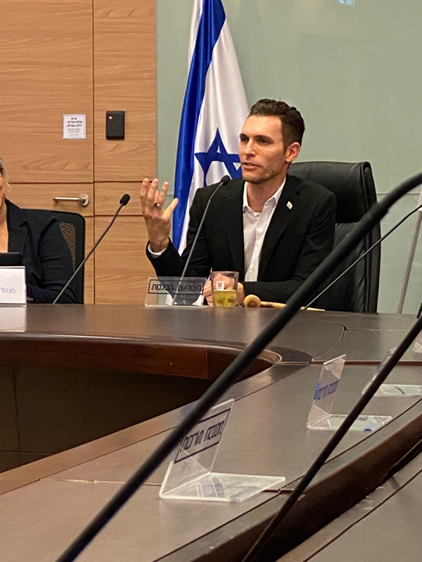


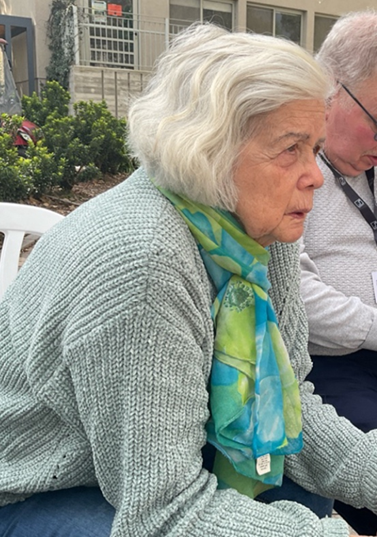
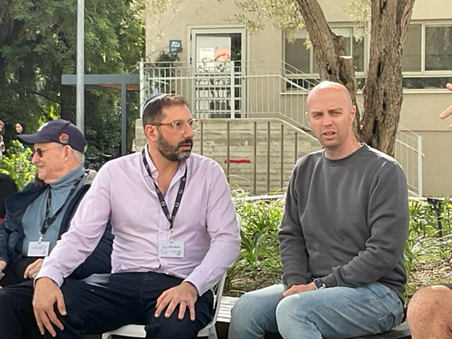
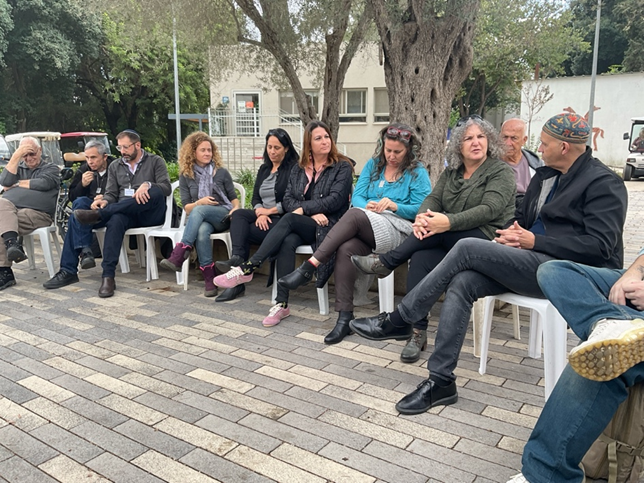
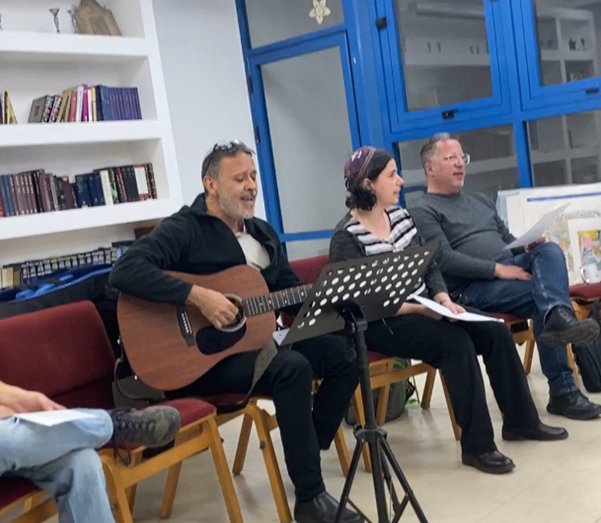

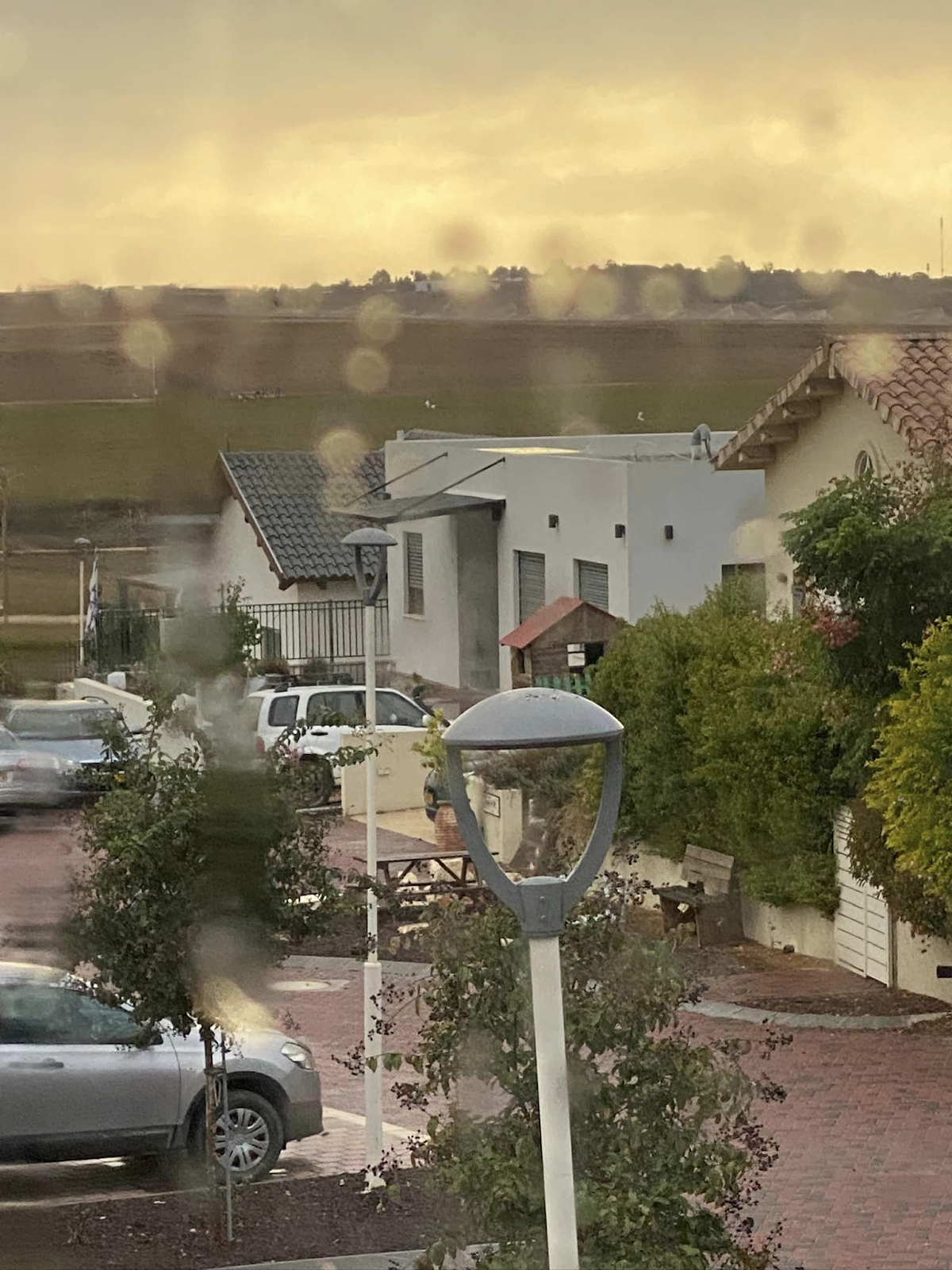
 (At Kibbutz Dorot)
(At Kibbutz Dorot)
